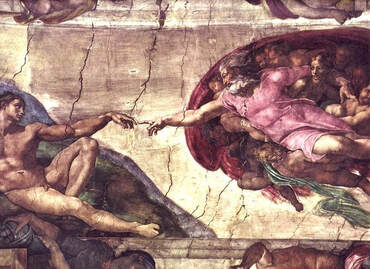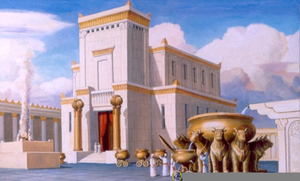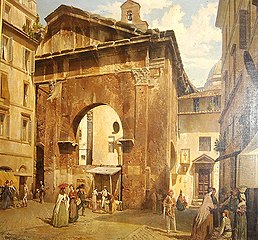|
Let me begin by stating that although I have a problem with certain aspects of Mr. Loeffler's article, I do not disagree with all of it. The article appeared on August 1, 2020 in Atlantic. As I read Mr. Loeffler’s argument, he expresses three areas of concern with the concept of "Judeo-Christian Tradition": 1. Christians persecuted Jews for 2,000 years, regarding them as “Other” and their religion as superseded. 2. “Judeo-Christian” is, in Loeffler's view, an exclusionary concept, as it suggests that Islam, Buddhism, and other religions are not accepted. 3. Judeo-Christian identity is not synonymous with American identity. Regarding Point #1: The times they are a-changin'. When someone offers an olive branch, it is probably better to accept it than to rehash old grudges. Since the Holocaust, most (but unfortunately not all) forms of Christianity have undertaken a re-evaluation of their relationship with Judaism and the Jews. There have been many mea culpas, most notably of course Vatican II, which jettisoned, for mainstream Roman Catholics, the idea that Jews were guilty of deicide—historically, one of the most powerful motivators of animosity between Christians and Jews. Judaism and Christianity are in fact two direct heirs of one Biblical Tradition. After the Romans destroyed the Second Temple of Jerusalem in 69-70 AD, eradicating the Temple-centric form of Judean monotheism, these two heirs re-interpreted the Biblical Tradition in parallel efforts to create institutions that could survive in the hostile Roman environment. One of these efforts was headed by Saul of Tarsus, known to Christians as St. Paul, who identified as a Judean (or, as we say today, "Jewish"); the other effort was the school of Yavneh, headed by Yohanan, son of Zakkai and others, which attempted to systemize and hand down a set of interpretive tools that would permit the Biblical Tradition (“Torah”) to remain relevant even in the absence of a Temple. Saul’s effort emphasized a particular interpretation of the messianic and apocalyptic aspect of Israelite monotheism; Yavneh’s effort de-emphasized that aspect, without however eliminating it. Both schools held the first-century Temple priests in low regard. To later generations, Saul’s effort became identified with “Christianity” and Yavneh’s with “Judaism.” I have attempted to bring all of this history to life in my new book, INTO THE UNBOUNDED NIGHT, which will be out September 1, 2020 from Regal House (see https://www.regalhousepublishing.com/product/into-the-unbounded-night/). As Christianity struggled to survive in Rome, it distanced itself from its Judean and Galilean roots. Both Judea (where the Temple had been located) and the Galilee (where Jesus had preached) were despised by Rome in the aftermath of the Jewish revolt that had led to the Roman destruction of the Second Temple. The early Church Fathers repudiated the Judaism of their founders, in part (I would submit) because they did not understand it. Thus “Christianity” separated itself from “Judaism” over time and became hostile to it. But again, in their origins “Christianity” and “Judaism” were not two separate religions. Although Jesus and Paul may have disagreed with the School of Yavneh on this or that point of belief or practice, they would never have stated that they belonged to a different religious or cultural group. In fact, they both were adamant on this point. They were both "Jews" (to use the language of English transations of the New Testament.) As for Point #2: To say there is a Judeo-Christian tradition, and that Buddhism and Islam (for example) are less closely related to Christianity and Judaism than Christianity and Judaism are to each other, is not to denigrate Buddhism and Islam; it is simply to state incontrovertible historical fact. Christianity and Judaism share the Old Testament. You can embrace this or that aspect of Old Testament theology or law or narrative, but history is history. The Koran is related to the Old Testament and the New Testament, but it is a different book. Whether it is “more true” or “less true” is not the question here.  It seems Loeffler’s main concern is with “American identity,” and in this respect I share his anxiety. Regardless of the utility of the concept of Judeo-Christian tradition, it would indeed be exclusionary to confuse this tradition—or any other religious tradition—with American identity. Our nation must be bigger and more encompassing than that. All religious traditions should be and are welcome, so long as they honor our culture of mutual tolerance. To put this another way, we are all members of one big family, which is called America and which is in turn a member of a larger family called humanity. Of course, we should all continue learning to love and respect each other, but there is no need to blur the historical record in that effort. Indeed, in my opinion, to do so would amount to perpetuating animosities rather than healing them. To speak of the Judeo-Christian heritage is not to assert that is superior to any other. Nor is it to assert that Judaism and Christianity are the same thing. But they share a common root. To speak of the Judeo-Christian heritage is simply to acknowledge history and to try to rebuild a cultural bridge where, for all too long, there was nothing but ignorance and pain. Again: of course this effort should not be abused for exclusionary purposes. If I embrace my brother or sister, that is not meant to imply that I reject my cousin. Indeed, I may feel personally closer to my cousin than to my sibling. Finally, Mr. Loeffler attempts to couch all this in the context of politics, i.e., as a Left/Right issue. To my mind, politics is always a distorting lens. To view history through the lens of politics amounts to rah-rah-ism, or propaganda. A Progressive can embrace the idea of a common Judeo-Christian Tradition just as well as a Conservative (and vice-versa). Again, history is history, regardless of contemporary political trends. To reject the effort to find commonalities is to reject progress, and might in fact be described as reactionary. As we advance I hope to see further linkages develop between Judaism, Christianity, Buddhism, Islam, Hinduism, and other faiths. Such linkages may not resemble the historical connection between Judaism and Christianity. They will be different but not necessarily less valid. All these traditions are narrative currents in the one great river of human culture. Mitchell James Kaplan graduated with honors in English Literature from Yale University. After college, Kaplan lived in Paris, France, where he worked as a translator, then in Southern California, where he worked as a screenwriter and in film production. He lives in the Blue Ridge Mountains of Virginia with his family and two cats.
1 Comment
 I write novels that are set in faraway times and places because I am fascinated with context. We tend to see the world from the place where we’re standing and from one angle. When you step back from your place and time you get a different picture. The world is inhabited not just by individuals but by groups of individuals—cultures—that are defined by the languages they speak and the stories they tell. Like individual humans, cultures encounter each other and what happens next is the drama of history. Sometimes one culture dominates another. Sometimes two cultures fall in love, mate, and beget child cultures. The story of my novel INTO THE UNBOUNDED NIGHT, due out September 1, 2020, unfolds during the First Century Roman Empire. Rome had extended its power throughout most of the known world and was continuing to push further. INTO THE UNBOUNDED NIGHT explores how this extension affected some of the cultures Rome encountered—the Celts of Britannia, the “Africans” of Carthage, and Judeans and Galileans in what we might call “the land of the monotheists,” which I will briefly discuss here. I use this term rather than “Israel” because there was no Israel in the time of the Roman occupation except in the reminiscence of the people who lived there. Using the “divide and conquer” strategy, the Romans had carved out several provinces: Idumea, the Galilee, Samaria, Judea, and others, and supported the rule of an Idumean family, the family of Herod, who descended not from a monotheistic culture but from a polytheistic one and were therefore regarded as outsiders by Judeans and others in the area. This is one reason among many for the negative portrayals of “Herod” in both the Talmud and the Christian New Testament. Nor do I use the term “Judaism” in my novel. It seems to me that “Judaism” did not exist, either. Even the idea of “religion” was foreign to the monotheists. “Religion” derives from a Latin term (religio, religionis) that refers to a belief system and a set of ritual practices. There is no word in ancient Hebrew for "religion." The culture that thought of themselves as descending from Moses via David thought of themselves more as a people, a nation, and heirs of a way of seeing history--with directionality and moral purpose. They were diverse—not “Jews” but Judeans, Galileans, etc. The Samaritans had their own temple, rejecting the primacy of the Great Temple of Jerusalem. Galileans, too—including Jesus and many of the rabbis—viewed the power of the Temple Priests in Jerusalem with suspicion, if only because the Temple priests were supported by Herod, who was supported by Rome, which was seen as a brutal occupier. But the Temple of Jerusalem, with its sacrificial practices (which very much resembled those of Rome) retained a powerful allure, if only because of the central role it had played in the history of Israel. Even rabbis who objected to the power of the Temple priests had to work with them in order to produce effective guidance—i.e., to rule on the increasingly narrow set of legal issues where Roman law did not pertain. By the way, INTO THE UNBOUNDED NIGHT includes a scene (the judgment of Stephanos, whom Christians call St. Stephen) where the distinction between Roman law and Judean law is crucial. The failure to understand this distinction has given rise to dangerously misleading interpretations of this event. The revolt of the Zealots against Rome in 69—70 AD, and its outcome, radically altered the identity of the monotheists. In the end, the Romans destroyed the Great Temple. The central modalities of monotheistic religious practice were forever disrupted, and the rabbis had to reinvent their tradition, placing the Torah narrative front and center and de-emphasizing sacrifice and other Temple rituals. A central character in this development was a man named Yohanan, son of Zakkai—who is also, therefore, one of the central characters in INTO THE UNBOUNDED NIGHT. At the same time, another group of rabbis, led by Saul of Tarsus, took a different path, creating a distinct flavor of the Israelite tradition—today known as Christianity. As a result of researching and writing INTO THE UNBOUNDED NIGHT—and especially, of living with Yohanan son of Zakkai, Saul of Tarsus, the Roman general (and later emperor) Vespasian, and a young woman from Britannia known as Aislin—I no longer see “Judaism” and “Christianity” as different religions. I see them, rather, as siblings in the family of cultures. You can focus on the differences but most of their DNA is shared. They say reading novels increases a person's empathy. The reader develops the ability to crawl into other people's skins. I would add that novels allow us to explore cultures and to see our own in a broader context. In the end, one hopes that this long-view way of seeing things enhances mutual understanding. |
